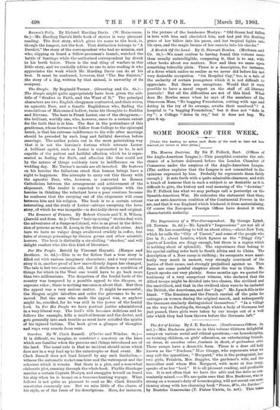The Impressions of a War - Correspondent. By George Lynch. (G. Newnes.
3s. 6d.)—Mr. Lynch's "Impressions" are not all of war. He has something to tell us about cities,—about New York, which he ealls the "City of Unrest," and some of the people who live in it ; about London, which figures as the "Dingy City" (parts of London are dingy enough, but there is a region which is nothing short of splendid). The experiences that belong to his special calling refer both to South Africa and to China. The description of a Boer camp is striking; its occupants were mani- festly very much in earnest, very strongly convinced of the justice of their cause, and strongly prejudiced against us. Then there are some painful chapters about the war in China. Mr. Lynch speaks out very plainly. Some months ago we quoted the testimony of a very competent witness, who declared that the Allied troops might be divided into two classes, the civilised and the uncivilised, and that in the civilised class were to be included the British, the Americans, and the " Japs." Mr. Lynch fills in the blank. "The Russians and the French carried off the palm for outrages on women during the original march, and subsequently the Germans similarly distinguished themselves." "In a village on the way to Paoting-fu, through which a body of Germans had just passed, three girls were taken by our troops out of a well into which they had been thrown before the Germans left."










































 Previous page
Previous page